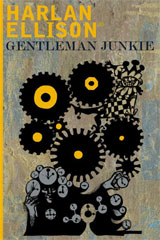
Harlan Ellison is a talent. He could, if he desired, be a fairly hilarious stand-up comedian, a more-than-decent balladeer, a respectable jazz musician, or what-have-you.
He makes his living at none of these.
He's a Writer.
This is an easy thing to say, and a very difficult thing to be. You have to have a certain talent to begin with, and then you have to develop it.
You develop it by first giving up your regular job because, as you quickly find out, serious writing is a full-time proposition and steady employment saps your strength and enthusiasm—so you take part-time jobs in bookstores, libraries, and beaneries, and you write in the early morning hours when the rest of the city is sound asleep (few people in the rest of the city have talents they want to develop).
You develop your talent by living on crackers and beans, by washing your own clothes and stringing them up on a wire in the john, by wearing the same shirt for a week and sleeping on your pants to give them a crease, and by living in a roach-ridden third-floor walk-up where there's only one water tap and the water's the same temperature come summer or winter—cold.
You develop that talent by writing like mad every free moment you have; by stealing away a few of those moments to read what's been written by other people; by submitting material to every magazine you know of, even if they only pay in packets of birdseed, and by being thrown bodily out of publishers' offices as well as agents'.
A lot of writers go through exactly this.
Ellison did.
A few writers have the guts and stamina to claw their way up from the bottom and finally Make It.
Ellison did.
All writers worth their salt (and despite what they go through) develop an empathy and a compassion for people and realize what so few outsiders do: that the characters you read about in fiction are not much different from the people you meet in Real Life, the acquaintances you make and the friends you love. It's not so much the material you work with, it's the view you take.
Ellison realizes this.
Read the following stories and you'll know what I mean. Harlan Ellison writes about the golden people, the tarnished people—Spoof and Marty Field and Tiger and Frenchie and Irish and the kids who hang out in the college sandwich shop—the little people with big problems who are no different from the people you know if only you could see the forest for the trees.
To take issue with an old saying, the rewards of virtue are a good deal more than virtue itself—of all the things in this world that do pay off, hard work heads the list. Exactly where the Big Time begins is hard to say—where does Wealth start and Poverty end, the interminable chain of scrounged meals and tiny, stuffy rooms get replaced by a decent diet and a Room with a View? In one sense, the Big Time for Ellison is only a page away. "Daniel White for the Greater Good" has been sold to the movies (what sort of job they'll do, I don't know, but if they're half as honest as the author, it will make Hollywood's pap look like . . . pap), a number—literally, plural—of novels are scheduled for early publication, and others have been inked on contract. Hard work pays. So does Talent.
And so does Truth. Ellison does not hide the fact that the hurtful youth and background of Marty Field in "Final Shtick" are his own, that Ivor Balmi of "Lady Bug, Lady Bug," is another dimly-realized facet of his own personality. In fact, like with any good author, most of his characters are partial reincarnations of himself. Literature is not found like raisins in the bland oatmeal of the Middle Classes. Authors with something to say are not Typical American Boys who have been raised in the soft and tender wombs of Suburbia. More often than not they've been kicked in the groin by life, and the scar tissue will always show.
So now the party's over and it's time to meet all those people behind the masks.
-Frank M. Robinson, coauthor,
The Glass Inferno